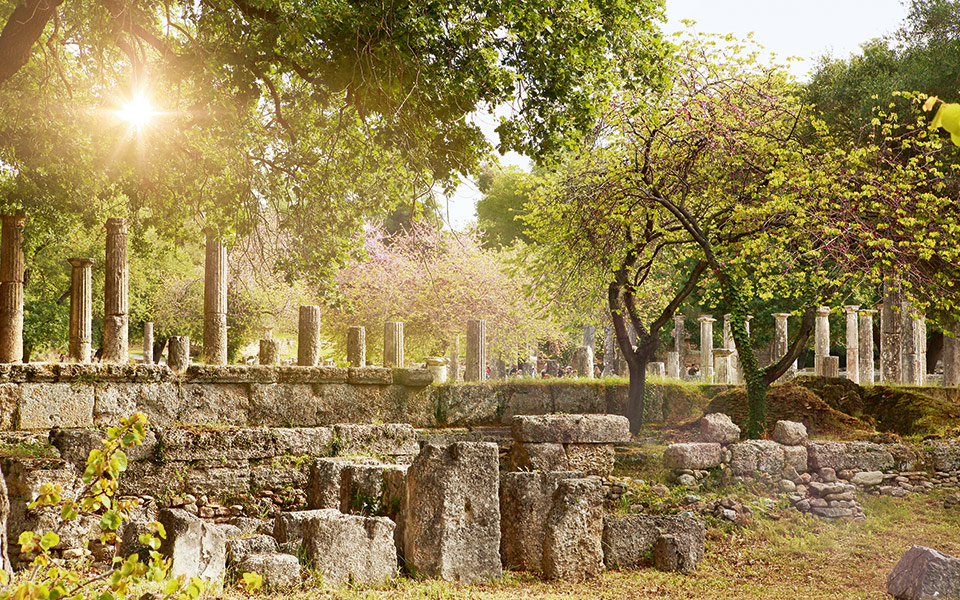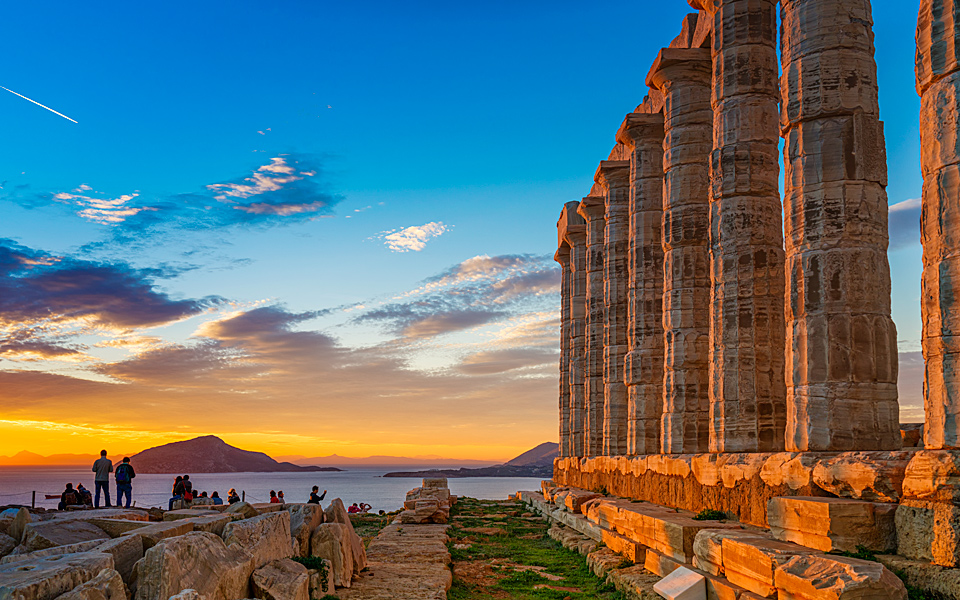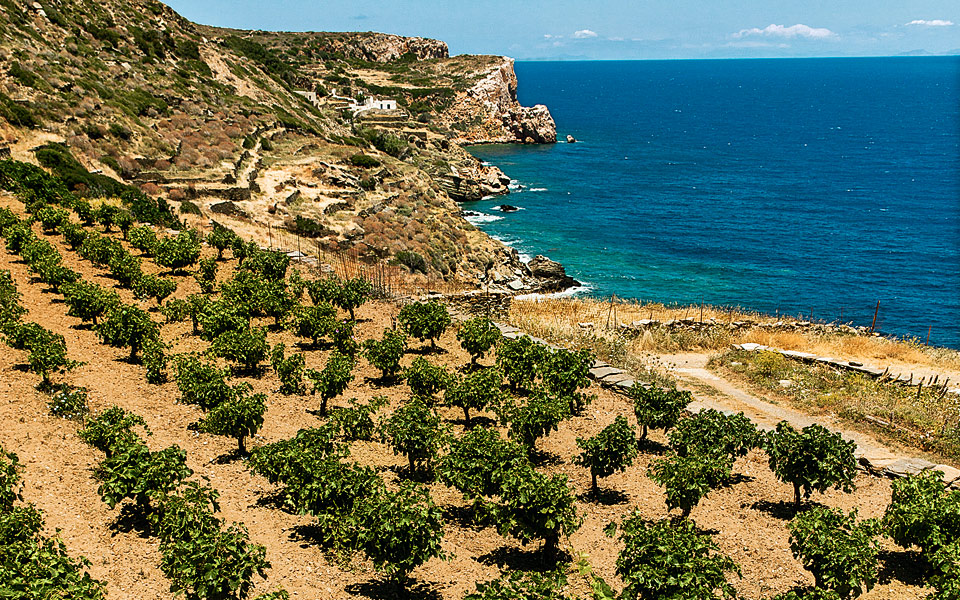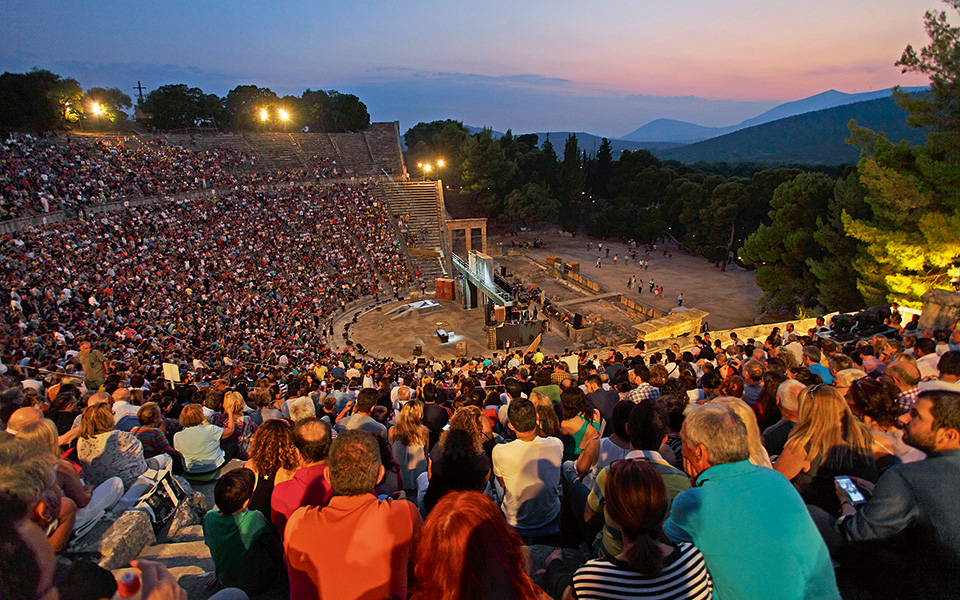Professor Edith Hall, an influential scholar of classics and inveterate traveler, shares her insights on the ancient Greek world, her personal experience of Greece, and the links between the Greek landscape and myth. She was interviewed by Kathimerini newspaper on the occasion of the release of the Greek translation (by Dioptra) of “Introducing the Ancient Greeks,” a book she first published in June 2014.
You have introduced a fresh approach to the study of ancient Greek culture. Can you recall the eureka moment – the event that made you want to study ancient Greece?
I certainly can, because it was very memorable. It was my first visit to Olympia when I was 19. I had studied the lyric poet Pindar in school, and found his poems very hard going, very difficulty to study. When I saw the landscape of ancient Olympia, it was like a revelation, because suddenly it all made sense: This was the topography that the poetry was written for, this was the very river that Pindar mentions in his odes, the light and the mountains. And it all started to make sense, the journey through Arcadia to get there was the arduous journey that the athletes would have taken to compete in the Olympic Games. That was when I decided to study classics at university.

© Mythical Peloponnese
Is Olympia still your favorite place in Greece?
I still think Olympia is special, but there are other places that I find even more evocative. One is the temple of Artemis at Brauron, where Athenian girls were brought in Classical times to be dedicated to the goddess. When you are in the center of Athens it is easy to forget how rural large parts of Attica still are. Here you have green marshland, full of birds and wildlife. I even have a photograph of a sign on the archaeological grounds that reads “No Hunting” – in the sacred precinct of Artemis the Huntress! When you see the site, with its wildlife, you can see why the Athenians dedicated it to her, just like hilltops were dedicated to Apollo. It is the spirit of the place. I brought both my daughters here when they were 10 or 11, approaching puberty, and it felt very special.
I also love the temple of Hera at Perachora on the Corinthian Gulf. This is also a spectacular natural setting. You remember that in the myth Medea brought her murdered children to be buried here, at the sanctuary of Hera Akraia, and the little cove that the temple is built in is very sheltered, like a mother’s embrace. It feels like a safe place.
Do you think that visiting the locations of ancient Greek myth and ritual can help us understand the ancient Greek mind-set?
The landscapes in Greek myths are rooted in real Greek topography, that is why I find it so rewarding to visit the places. My aim is to visit every location mentioned in Greek mythology. I have written about Euripides’ tragedy “Iphigenia in Tauris,” and have traced the locations in the plot all the way from Aulis (modern Avlida) in Boeotia (Viotia), where she was taken to be sacrificed, to Tauris, where she was spirited away. Tauris is located near modern Sebastopol, in the Crimea. This is fascinating because the Black Sea was part of the Greek world until very recently, in fact until 1922, when the population exchange ended the Greek presence there. The Black Sea is of great emotional and cultural importance to both ancient and modern Greeks.

© Perikles Merakos
Your book which has just been published in Greek is about the character of the ancient Greeks and how that shaped their contribution to global civilization. How would you explain the “Greek miracle”? How is it that such a small place gave birth to such important concepts as democracy, free thinking, philosophy, rational science and empirical medicine?
I make it clear in my book that this amazing development has nothing to do with racial superiority, indeed the Greeks themselves did not define their identity through blood. Herodotus defines it as shared ancestry, rituals, way of life and language. In the book I tried to define 10 aspects of that cultural “personality.” It is not an orthodox way to write ancient history, but I have found people enjoy it and I hope it makes them feel closer to the ancient Greek mind-set.
The “Greek miracle” has a lot to do with being in the right place at the right time – to transform the achievements of other cultures in the surrounding regions, North Africa, the Levant and ancient Near East, into something radically new. Curiosity and love of innovation are two of the features that I highlight as being characteristic of ancient Greek culture, along with love of travel and exploration. These characteristics were born out of harsh necessity. The poverty of the Greek environment forced the ancient Greeks to travel and colonize not only the Mediterranean but also the Black Sea. Because they did not have huge fertile flood plains to cultivate as the Egyptians and the Mesopotamian civilizations did, they had to leave home, and that diaspora was at the root of the “Greek miracle.”
In their expansion, Greeks found themselves in new environments and had to adapt to them, and that is how science was born. The natural philosopher Thales, half-Greek and half-Phoenician, living in Miletus on the mouth of the Meander River on the western coast of modern Turkey, had to find a way to stop the estuary from silting up and separating the city from the sea. The Greek speakers living in Anatolia stopped explaining natural phenomena by divine intervention, and looked for material causes. They were practical. The Greeks who colonized Olbia in the modern Ukraine had to develop sophisticated viticulture, including grafting, and genetic manipulation, in order to grow grapes and make wine in the colder climate, because they considered wine so essential to their way of life. Some reviewers have criticized me for ignoring Athens and the polis (the city-state) in favor of the sea and the horizon, but that is precisely my point.
“Curiosity and love of innovation are two of the features that I highlight as being characteristic of ancient Greek culture, along with love of travel and exploration.”

© Dimitris Vlaikos
The sea is central to the idea of “Greekness” as you present it. Why is that?
My perspective on the ancient Greeks is intended to emphasize the geographical and chronological spread of the ancient Greeks and their communities. Traditional Classical scholarship puts the individual polis – usually Athens, or Athens in comparison with Sparta or Syracuse – at the center of the radar. Instead I put the sea at the center of the radar, the sea as the meeting place across which Greeks constantly traveled to talk to their fellow Greeks in other communities – Plato’s “frogs croaking at each other around the pond.”
It is interesting that Greeks who colonized landlocked areas, such as Alexander’s conquests in Bactria, between modern Afghanistan and India, lost their language much quicker than coastal Greeks who kept it for millennia, not only under Macedonian and Roman rule but also under the Ottomans and the Italians.
Who is your favorite ancient Greek?
Definitely Aristophanes! His wit is so sharp and his satire is merciless. The idea that satire is important in a democracy, the ability to poke fun at those in power, is incredibly relevant to our present day. One of the things I have noticed about Greeks is that they are able to laugh even in the darkest hours. This is very psychologically sustaining. And you get the sense that Aristophanes as a person was great company, too. In Plato’s Symposium he is the last person to stay up drinking with Socrates, talking into the night. In the Symposium he also says some beautiful things about love, about how people are incomplete when they are severed from their other half, no matter what their gender is.

© Olga Charami
Do you have a favorite bit of Greek trivia?
Pentelic marble is twice-baked seashells. Did you know that? The stone that the Parthenon is made of is such pure white because when it was formed it went through two volcanic events, not just one. It’s funny to think that all of Attica was at the bottom of the sea once, when these rocks started to form. I wanted to see where the marble came from, so I visited the quarries at Dionysos. I was given a tour by the workmen, all hardworking men, doing a dangerous job, and the foreman told me this. It is staggering to think of the human labor that went into cutting the stone out and transporting it to the top of the hill in Athens, before the age of steam. That is one reason why I think all the sculptures should be restored there, as a tribute to that effort.
Edith Hall is professor in the Classics Department and Center for Hellenic Studies at King’s College, London. She has published more than 20 books on ancient Greek literature and culture, the most recent of which is “Introducing the Ancient Greeks” (published in English by W.W. Norton & Company, and in Greek by Dioptra). She was recently awarded an honorary doctorate by the University of Athens.
This article was first published by ekathimerini.com on 11/11/2017












